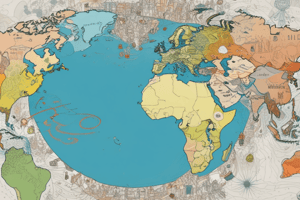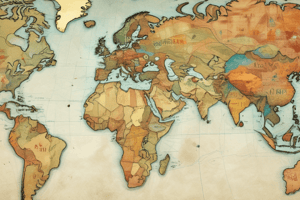Podcast
Questions and Answers
Define cultural appropriation and provide an example.
Define cultural appropriation and provide an example.
Cultural appropriation is the adoption or use of elements of one culture by members of another culture, often without permission or understanding. An example is wearing a Native American headdress as a fashion statement.
What is the difference between nationalism and ethnonationalism?
What is the difference between nationalism and ethnonationalism?
Nationalism is the belief in and advocacy for the interests and culture of one's nation, often accompanied by a sense of superiority over other nations. Ethnonationalism emphasizes the cultural or ethnic identity of a nation, sometimes leading to exclusionary or xenophobic attitudes towards other groups.
Explain the concept of transnational corporations and their impact on the global economy.
Explain the concept of transnational corporations and their impact on the global economy.
Transnational corporations are large companies that operate in multiple countries and have production facilities, sales, and other activities in various nations. They play a significant role in the global economy and often have a substantial influence on politics and society.
Describe the practice of cultural imperialism and its effects on local cultures.
Describe the practice of cultural imperialism and its effects on local cultures.
What were the historical categorizations of countries as First World, Second World, and Third World during the Cold War?
What were the historical categorizations of countries as First World, Second World, and Third World during the Cold War?
Explain the concept of glocalization and provide an example.
Explain the concept of glocalization and provide an example.
What is the difference between nation and state?
What is the difference between nation and state?
Describe the concept of cosmopolitanism and its implications.
Describe the concept of cosmopolitanism and its implications.
Differentiate between embodied and disembodied globalization with examples.
Differentiate between embodied and disembodied globalization with examples.
Explain the concept of objectified globalization and how it impacts the world.
Explain the concept of objectified globalization and how it impacts the world.
What are some lasting legacies of colonialism?
What are some lasting legacies of colonialism?
Define the term 'Ethnonationalism' and explain its potential attitudes towards other groups.
Define the term 'Ethnonationalism' and explain its potential attitudes towards other groups.
What is the role of the 'Big Five' in the United Nations?
What is the role of the 'Big Five' in the United Nations?
Explain the concept of 'Cultural Imperialism' and how it impacts local cultures.
Explain the concept of 'Cultural Imperialism' and how it impacts local cultures.
What do 'Race' and 'Ethnicity' refer to, and how are they different?
What do 'Race' and 'Ethnicity' refer to, and how are they different?
Flashcards are hidden until you start studying




